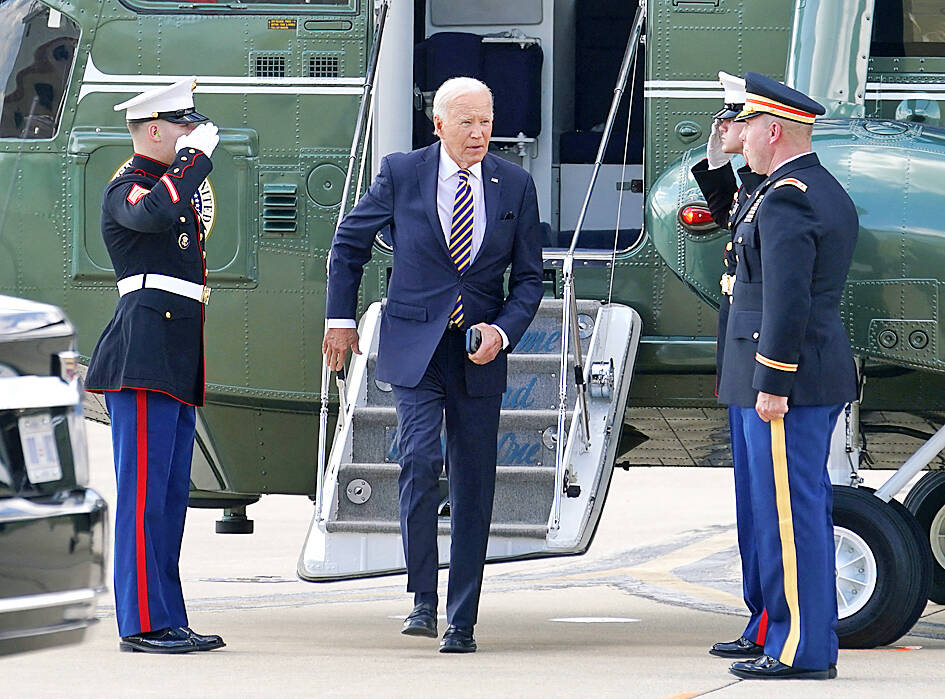Leaders of Australia, India, Japan and the US were yesterday to announce plans for new security initiatives in the Indian Ocean, as outgoing US President Joe Biden hosts counterparts from the Quadrilateral Security Dialogue (Quad) he has pushed as a counterweight to China.
Biden on Friday met with Australian Prime Minister Anthony Albanese at his home near Wilmington, Delaware, where the two discussed bilateral cooperation across defense and security, including in the Indo-Pacific region, Albanese’s office said in a statement yesterday.
The US president was yesterday to welcome Albanese, Indian Prime Minister Narendra Modi and Japanese Prime Minister Fumio Kishida for a four-way discussion to stress the importance of maintaining the Quad, which he sees as a signature foreign policy achievement, before he leaves office early next year.

Photo: Reuters
Senior Biden administration officials told reporters that the leaders would announce plans to expand an Indo-Pacific partnership for maritime domain awareness initiative launched two years ago to include the Indian Ocean region.
The leaders would also announce a plan for joint coast guard operations that would see Australian, Japanese and Indian personnel spend time on a US Coast Guard vessel, and plans for increased military logistics cooperation, the officials said.
They said the leaders would step up work to provide critical and security technologies, including a new open radio access network, to the Pacific islands and Southeast Asia, regions of intense competition with China, Washington’s main strategic competitor.
Analysts said the expected outcomes would mostly build on work that has already been done within the Quad, which Biden elevated to summit level in 2021.
“A new Quad maritime security initiative would send a very strong signal to China, that its maritime bullying is unacceptable, and that it would be met with coordinated action by this coalition of like-minded nations,” said Lisa Curtis said, a senior fellow and director of the Indo-Pacific Security Program at the Center for a New American Security.
Analysts and officials said Biden hosting the Quad is part of efforts to institutionalize the body ahead his departure from office and that of Kishida, and before elections in Australia next year.
In Philadelphia on Friday, Albanese said he was confident the AUKUS defense pact of Australia, the UK and the US — formed in 2021 to address shared worries about China’s growing power — would be supported by any future US administration.
“There is no question in my mind that AUKUS will continue to have the support of any future US administration,” Albanese said in a televised media conference from Philadelphia.

LONG FLIGHT: The jets would be flown by US pilots, with Taiwanese copilots in the two-seat F-16D variant to help familiarize them with the aircraft, the source said The US is expected to fly 10 Lockheed Martin F-16C/D Block 70/72 jets to Taiwan over the coming months to fulfill a long-awaited order of 66 aircraft, a defense official said yesterday. Word that the first batch of the jets would be delivered soon was welcome news to Taiwan, which has become concerned about delays in the delivery of US arms amid rising military tensions with China. Speaking on condition of anonymity, the official said the initial tranche of the nation’s F-16s are rolling off assembly lines in the US and would be flown under their own power to Taiwan by way

‘OF COURSE A COUNTRY’: The president outlined that Taiwan has all the necessary features of a nation, including citizens, land, government and sovereignty President William Lai (賴清德) discussed the meaning of “nation” during a speech in New Taipei City last night, emphasizing that Taiwan is a country as he condemned China’s misinterpretation of UN Resolution 2758. The speech was the first in a series of 10 that Lai is scheduled to give across Taiwan. It is the responsibility of Taiwanese citizens to stand united to defend their national sovereignty, democracy, liberty, way of life and the future of the next generation, Lai said. This is the most important legacy the people of this era could pass on to future generations, he said. Lai went on to discuss

MISSION: The Indo-Pacific region is ‘the priority theater,’ where the task of deterrence extends across the entire region, including Taiwan, the US Pacific Fleet commander said The US Navy’s “mission of deterrence” in the Indo-Pacific theater applies to Taiwan, Pacific Fleet Commander Admiral Stephen Koehler told the South China Sea Conference on Tuesday. The conference, organized by the Center for Strategic and International Studies (CSIS), is an international platform for senior officials and experts from countries with security interests in the region. “The Pacific Fleet’s mission is to deter aggression across the Western Pacific, together with our allies and partners, and to prevail in combat if necessary, Koehler said in the event’s keynote speech. “That mission of deterrence applies regionwide — including the South China Sea and Taiwan,” he

UNPRECEDENTED: In addition to the approved recall motions, cases such as Ma Wen-chun’s in Nantou are still under review, while others lack enough signatures The Central Election Commission (CEC) announced yesterday that a recall vote would take place on July 26, after it approved the first batch of recall motions targeting 24 Chinese Nationalist Party (KMT) lawmakers and Hsinchu Mayor Ann Kao (高虹安). Taiwan is in the midst of an unprecedented wave of mass recall campaigns, following a civil society push that echoed a call made by Democratic Progressive Party (DPP) caucus whip Ker Chien-ming (柯建銘) in January to initiate signature drives aimed at unseating KMT legislators. Under the Civil Servants Election and Recall Act (公職人員選舉罷免法), Taiwanese can initiate a recall of district-elected lawmakers by collecting